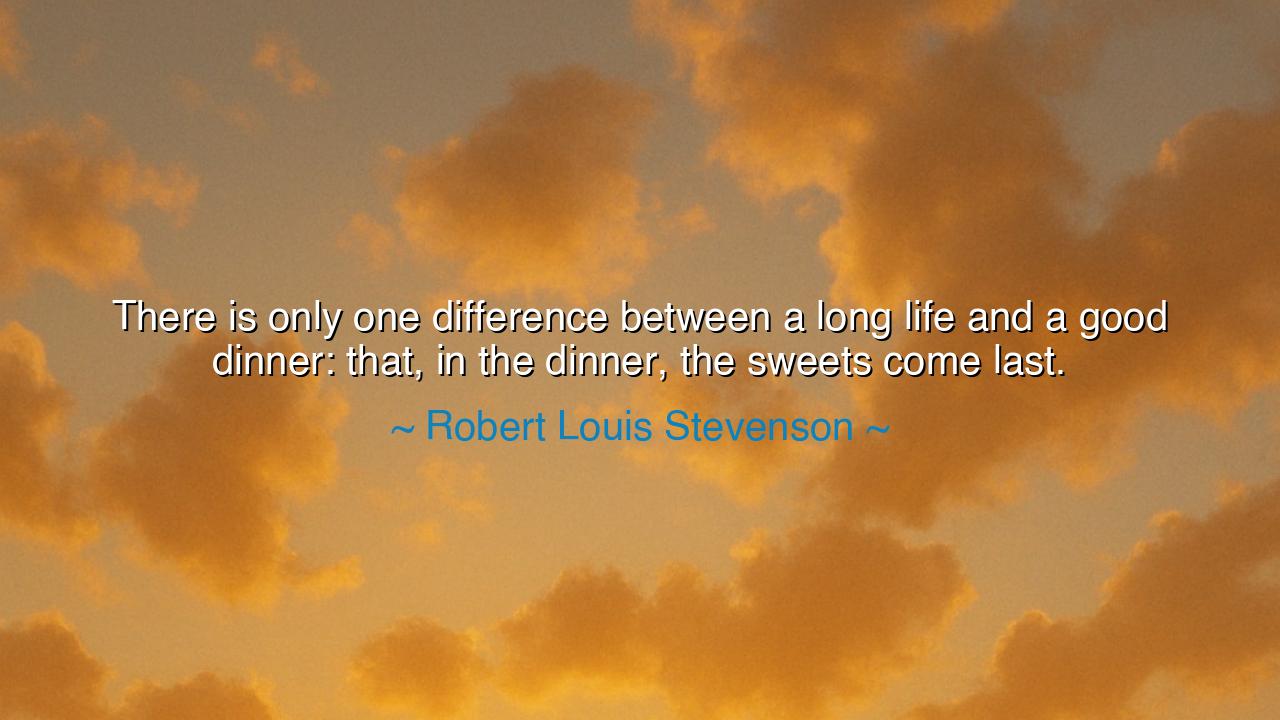
There is only one difference between a long life and a good
There is only one difference between a long life and a good dinner: that, in the dinner, the sweets come last.






"There is only one difference between a long life and a good dinner: that, in the dinner, the sweets come last." – Robert Louis Stevenson.
In these words, Robert Louis Stevenson offers a playful yet profound reflection on the nature of life and death, drawing a comparison between the two with the imagery of a good dinner. A dinner, like life, begins with the simple things, the main courses that nourish us, and eventually leads us to the sweetness, the joys and pleasures that come after the work is done. Stevenson suggests that while life is long and often filled with challenges, the most sweet and fulfilling moments may only come after a long journey, much like the dessert following a satisfying meal.
The ancients, too, understood the value of patience and timing in the pursuit of fulfillment. In Greek philosophy, Aristotle taught that true happiness is achieved through a life of virtue and balance, a life that is long and filled with meaning. Yet, he also recognized that pleasure—the sweetness of life—must come as a result of a well-lived life, not as an immediate reward. Just as one does not rush through the main course to get to the dessert, we must not rush through life to find its most fulfilling moments. Wisdom and contentment come to those who live fully and with purpose, who embrace the journey of life and its challenges, waiting for the sweets to come at their proper time.
Consider the example of Mahatma Gandhi, a man whose life was not marked by immediate pleasures or rewards but by a long and arduous journey of sacrifice and service. Gandhi’s life was one of struggle and patience, as he dedicated himself to the cause of Indian independence through non-violent resistance. Yet, as the years passed and freedom was won, he saw the sweetness of his efforts—the joy of liberation, not just for himself but for an entire nation. His life was not full of immediate gratification but was instead a series of steps and decisions that eventually led to the sweet fruit of justice and freedom.
The long life of Nelson Mandela provides another powerful example of Stevenson’s insight. Mandela’s path was not an easy one. He spent 27 years in prison, enduring hardship and injustice, and yet he did not falter in his commitment to peace and reconciliation. His efforts were marked by immense sacrifice, and for much of his life, there were no immediate rewards. But, in the end, after decades of struggle, the sweetness of a free and united South Africa came to him, the result of years of perseverance and dedication. His life, much like the dinner Stevenson speaks of, began with the main course of struggle and hardship, but it ended with the sweet fruits of freedom and forgiveness.
What Stevenson teaches us, then, is that the sweetness of life, like dessert, often comes last—it is not the beginning of the journey but the culmination of a life well-lived. The main course—the trials, the effort, the perseverance—are what allow us to truly appreciate the joys that come later. Instant gratification, the desire for sweetness at the beginning of the journey, can often lead to disappointment and emptiness. But by embracing life’s challenges with grace and patience, we allow the sweetness of life to find its proper place, offering us the satisfaction of a fulfilled existence.
The lesson here is one of patience and delayed gratification—that the most meaningful moments in life often come after a long period of effort and commitment. Whether in our personal goals, relationships, or society, we must learn to embrace the journey, understanding that it is the struggles and challenges along the way that ultimately prepare us for the joys that come. The sweets of life, whether they be peace, success, or happiness, are all the more rewarding because they come after a life lived with purpose.
In our own lives, let us not rush to seek the sweetness before we have properly nourished ourselves with the experiences and lessons life offers. Let us embrace the main course—the hard work, the sacrifices, and the challenges—with the knowledge that in due time, the sweetness will come. It is only by enduring the length of days, with its trials and joys, that we can truly appreciate the dessert that life has to offer. And when that time comes, it will be all the sweeter for the effort we have made.






AAdministratorAdministrator
Welcome, honored guests. Please leave a comment, we will respond soon